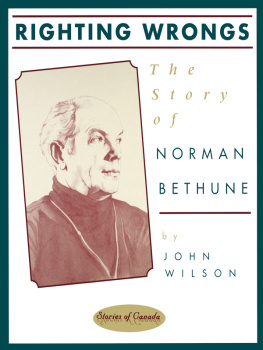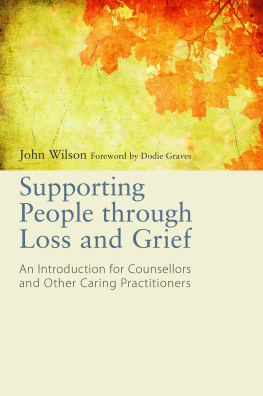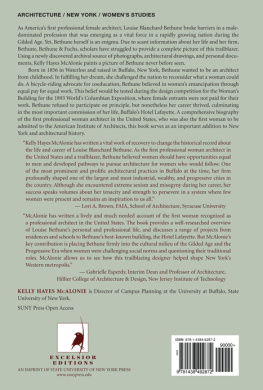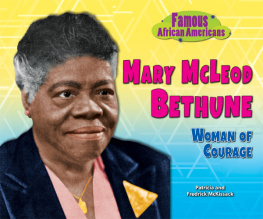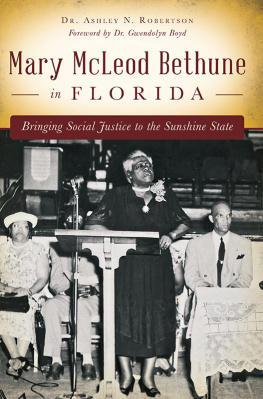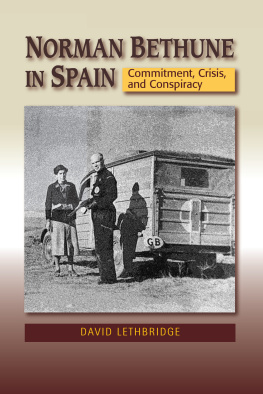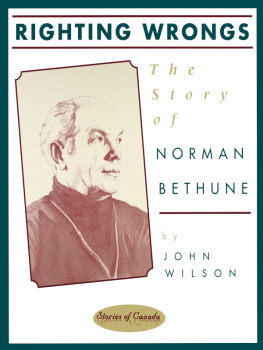

Stories of Canada
Righting Wrongs
The Story of Norman Bethune
by
John Wilson
Text copyright 2002 Sydell Waxman
Illustrations copyright 2001 Liz Milkau
All rights in this book are reserved. No part of this publication may be
reproduced, stored in a retrieval system or transmitted, in any form
or by any means, electronic, mechanical, photocopying or
otherwise, without the prior written consent of the publisher.
Napoleon Publishing
Toronto Ontario Canada |  |

Napoleon Publishing gratefully acknowledges
the support of the Canada Council
for our publishing program.
Printed in Hong Kong

National Library of Canada Cataloguing in Publication Data
Wilson, John (John Alexander), date
Righting wrongs: the story of Norman Bethune
(Stories of Canada)
ISBN 0-929141-71-7
1. Bethune, Norman 1890-1939Juvenile literature. 2. SurgeonsCanadaBiography Juvenile literature. I. Title II. Series: Stories of Canada (Toronto, Ont.)
| R464.B4W543 2001 | 617092 | C2001-901971-8 |
Righting Wrongs
The Story of Norman Bethune
by
John Wilson

Illustrations by Liz Milkau

Napoleon Publishing

Contents
A Race of Men
Dr. Norman Bethune talked proudly of his ancestry. He claimed they included: a Norman nobleman who served William the Conqueror; a poet who wrote verse over 800 years ago; a Sixteenth Century Scottish Cardinal who enjoyed watching as Protestants were burned alive beneath his castle window; a handmaid to Mary, Queen of Scots; a surgeon who fought at the Battle of Culloden Moor in Scotland in 1746; and a Presbyterian minister who was imprisoned during the American Revolution.
They all lived in times very different from our own, and each had an effect on the times in which he or she lived. However, none worked as hard, or in so many different ways, to change and improve the lot of their fellows as did the Bethune who was born in a small Ontario town in 1890.
On March 1, 1546, Cardinal David Beaton (as Bethune was spelled in Scotland in those days) watched from a window of St. Andrews castle in Scotland as George Wishart was burned at the stake for criticizing the Roman Catholic church. David Beaton was the most powerful man in Scotland. By burning Wishart, he was trying to halt the new ideas that were sweeping his country and his church. He failed. On May 29 a band of Protestants broke into the castle, killed Beaton and threw his body from the very window he had sat at on that fiery afternoon less than three months before.
David Beaton died trying to prevent change. Almost 400 years later, his ancestor, Norman Bethune, was to die trying to bring about change.
Getting Sick, Getting Well
Today, if you get sick, you go to a doctor, and he or she works to make you well again. In Norman Bethunes day, if you got sick and had enough money, you went to a doctor, and he or she worked to make you well. If you got sick and were poor, you either stayed sick or found one of the few doctors like Bethune who would treat you for free.
Norman Bethune had a dream of medical care for everyone, regardless of how much money they had. He worked in clinics which treated unemployed and poor people for free. He wrote articles and letters to politicians saying how he thought medical care in Canada should be organized. He gave speeches to other doctors telling them what he saw as wrong in the way they treated the sick.

Bethune operating in Montreal
We take medical care for granted today, but if it were not for Norman Bethune and others like him, we might still have to stay sick if we couldnt afford to pay a doctor.
Universal medicare like Bethune dreamed of came late to Canada. Saskatchewan was the first province to introduce it in 1962. All Canadians were covered by 1971, almost forty years after Bethune fought for it.
The White Plague
In Bethunes day, antibiotics had not been discovered. There is a disease called tuberculosis. It was also once known as the White Plague, and it killed thousands of Canadians every year. Bethune himself had tuberculosis in 1926. He was lucky; he recovered. But because of his experience with the disease, he decided to become a chest surgeon and help others with the disease.
For ten years he worked tirelessly operating on and saving patients who were so sick that other doctors had given up hope. He also improved and invented surgical instruments to make his work easier. Some of them are still in use in hospitals today.
Bethune saw a disease that had no cure. He did not discover a cure, but he worked hard to change the way patients were treated. As a result, many hundreds of people who might otherwise have died lived long and happy lives.
Egyptian kings more than 2000 years ago suffered from tuberculosis. Tuberculosis is caused by bacteria, which an English doctor, Benjamin Marten, in 1720 called wonderfully minute living creatures. They are passed from person to person in salivaif someone with tuberculosis coughs in your face, you can catch the disease.
Tuberculosis usually affects the lungs and, in the days before antibiotics, it was often fatal. During the First World War, more Canadians died at home of tuberculosis than were killed in the battles in Europe. The disease used to spread rapidly in the dirty, overcrowded buildings where poor families were forced to live.
Since the poor could not afford to go and see a doctor or take time off work for treatment, they stayed at home, gradually infecting the rest of their family. Bethune argued that if the living conditions of the poor were improved, the spread of tuberculosis could be stopped.
A Better World
When he was working in Detroit in 1925, Bethune was called out one night to attend to a poor woman who was giving birth. He was taken to a disused railway carriage, in which a large family lived in poverty. He delivered the baby and turned down the husbands offer of a dollar payment. It was the mans entire savings.
Bethune did not think that the baby would live very long in the conditions in the carriage. It made him very angry. He realized that a job for the babys father, paying as little as $20 a week, would do more for the health of the family than all his medical skill and training.
From that time on, Bethune fought against injustice and worked to change a system which he saw as the cause of the poor familys troubles.
Next page
